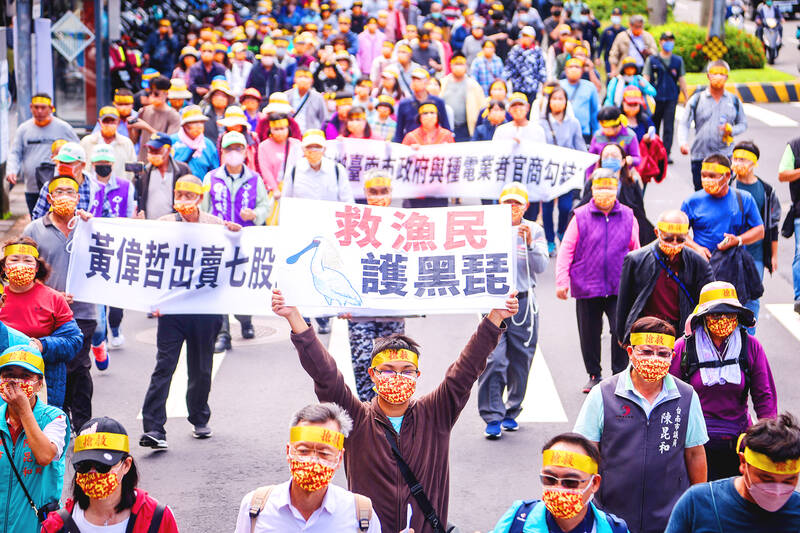Tainan residents yesterday gathered in front of the Presidential Office Building in Taipei to protest solar energy projects in Tainan’s Cigu District (七股), which they say endanger fish farms, agricultural land and natural habitats.
There should be a binding limit on new projects, they said.
The photovoltaic facilities in Cigu are some of the largest power plants of their type in Taiwan. The government is planning to add more capacity to achieve its net zero emissions goal by 2050.

Photo: CNA
About 200 protesters participated in the event organized by the Alliance to Save the Lands of Cigu, with some holding up banners that read: “Impose construction limits to stop photovolaitic overdevelopment in Cigu,” among other demands.
The demonstrators marched to the Executive Yuan and dumped clam shells near the building before attending a public hearing at the Legislative Yuan.
Cigu Borough Wardens Association vice president Huan Hsien-li (黃仙立) said that Cigu residents support the government’s energy policy and solar power, but believe photovoltaic installations should not be set up on land used for agriculture.
The government has allowed contractors to develop solar projects in Cigu without enough oversight, resulting in 11.48km2, or about 10 percent of the district’s area, being occupied by solar farms, he said.
Contractors are allegedly planning to develop about the same area for new projects, which would result in about one-sixth of land nationwide used for solar farms being in Cigu, he said.
Yang Hui-chin (楊惠欽), an environmental advocate based in Cigu, said solar farms have been set up on land formerly used for clam aquaculture, adding that the solar sector endangers the wintering grounds of the black-faced spoonbill.
Cigu-based pisciculturist Chiu Chuan-yi (邱創禕), a recipient of the Council of Agriculture’s commendation of excellence for young farmers, said the solar projects cut fish farmers off from feed sources for their fish.
Landowners have their properties rezoned without warning the farmers, leading to the rent for farmland in the district increasing 10-fold, he said, adding that the developments diminish the job prospects for young people.
Independent Tainan City Councilor Chen Kun-he (陳昆和) accused Tainan Mayor Huang Wei-che (黃偉哲) of colluding with private interests for personal gain and urged law enforcement to investigate the projects.
Executive Yuan spokesman Lo Ping-cheng (羅秉成) said Premier Su Tseng-chang (蘇貞昌) has ordered a task force to be convened to deal with farmers’ complaints.
There is a mechanism for community feedback and officials are working with residents to resolve the problems, Deputy Minister of Economic Affairs Tseng Wen-sheng (曾文生) said.
The protesters’ demand for a binding limit on new projects is not feasible, he said, but urged Cigu residents to voice their concerns through the existing mechanisms to help make adjustments to new projects.

CAUTION: Based on intelligence from the nation’s security agencies, MOFA has cautioned Taiwanese travelers about heightened safety risks in China-friendly countries The Ministry of Foreign Affairs (MOFA) yesterday urged Taiwanese to be aware of their safety when traveling abroad, especially in countries that are friendly to China. China in June last year issued 22 guidelines that allow its courts to try in absentia and sentence to death so-called “diehard” Taiwanese independence activists, even though Chinese courts have no jurisdiction in Taiwan. Late last month, a senior Chinese official gave closed-door instructions to state security units to implement the guidelines in countries friendly to China, a government memo and a senior Taiwan security official said, based on information gathered by Taiwan’s intelligence agency. The

The National Immigration Agency (NIA) said yesterday that it will revoke the dependent-based residence permit of a Chinese social media influencer who reportedly “openly advocated for [China’s] unification through military force” with Taiwan. The Chinese national, identified by her surname Liu (劉), will have her residence permit revoked in accordance with Article 14 of the “Measures for the permission of family- based residence, long-term residence and settlement of people from the Mainland Area in the Taiwan Area,” the NIA said in a news release. The agency explained it received reports that Liu made “unifying Taiwan through military force” statements on her online

Taiwan Semiconductor Manufacturing Co (TSMC), the world’s largest contract chipmaker, said yesterday that it is looking to hire 8,000 people this year, at a time when the tech giant is expanding production capacity to maintain its lead over competitors. To attract talent, TSMC would launch a large-scale recruitment campaign on campuses across Taiwan, where a newly recruited engineer with a master’s degree could expect to receive an average salary of NT$2.2 million (US$60,912), which is much higher than the 2023 national average of NT$709,000 for those in the same category, according to government statistics. TSMC, which accounted for more than 60 percent

Tung Tzu-hsien (童子賢), a Taiwanese businessman and deputy convener of the nation’s National Climate Change Committee, said yesterday that “electrical power is national power” and nuclear energy is “very important to Taiwan.” Tung made the remarks, suggesting that his views do not align with the country’s current official policy of phasing out nuclear energy, at a forum organized by the Taiwan People’s Party titled “Challenges and Prospects of Taiwan’s AI Industry and Energy Policy.” “Taiwan is currently pursuing industries with high added- value and is developing vigorously, and this all requires electricity,” said the chairman